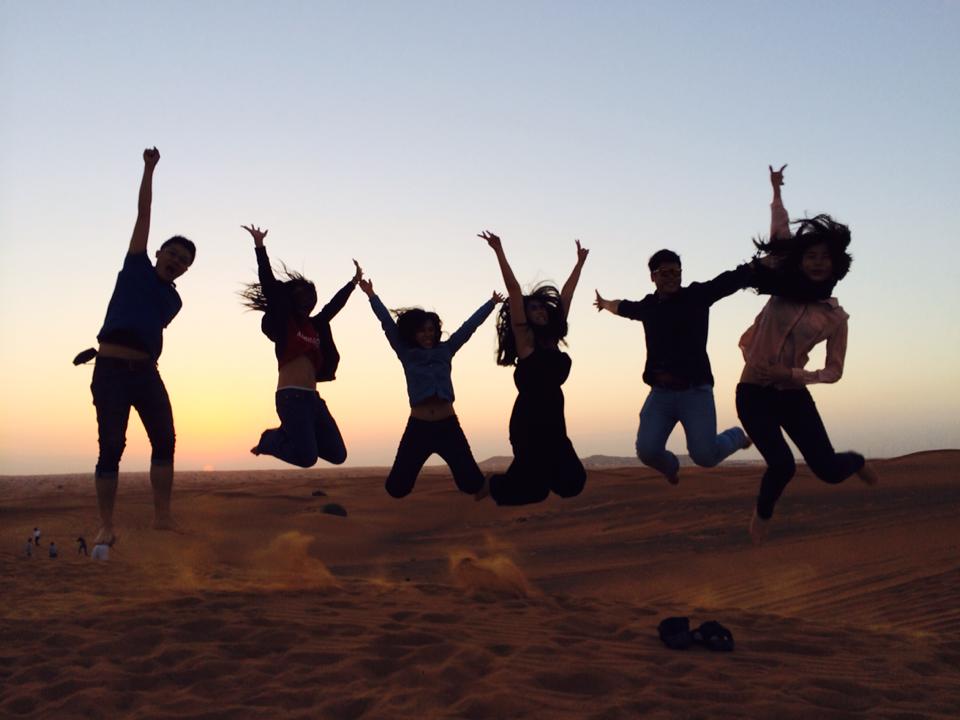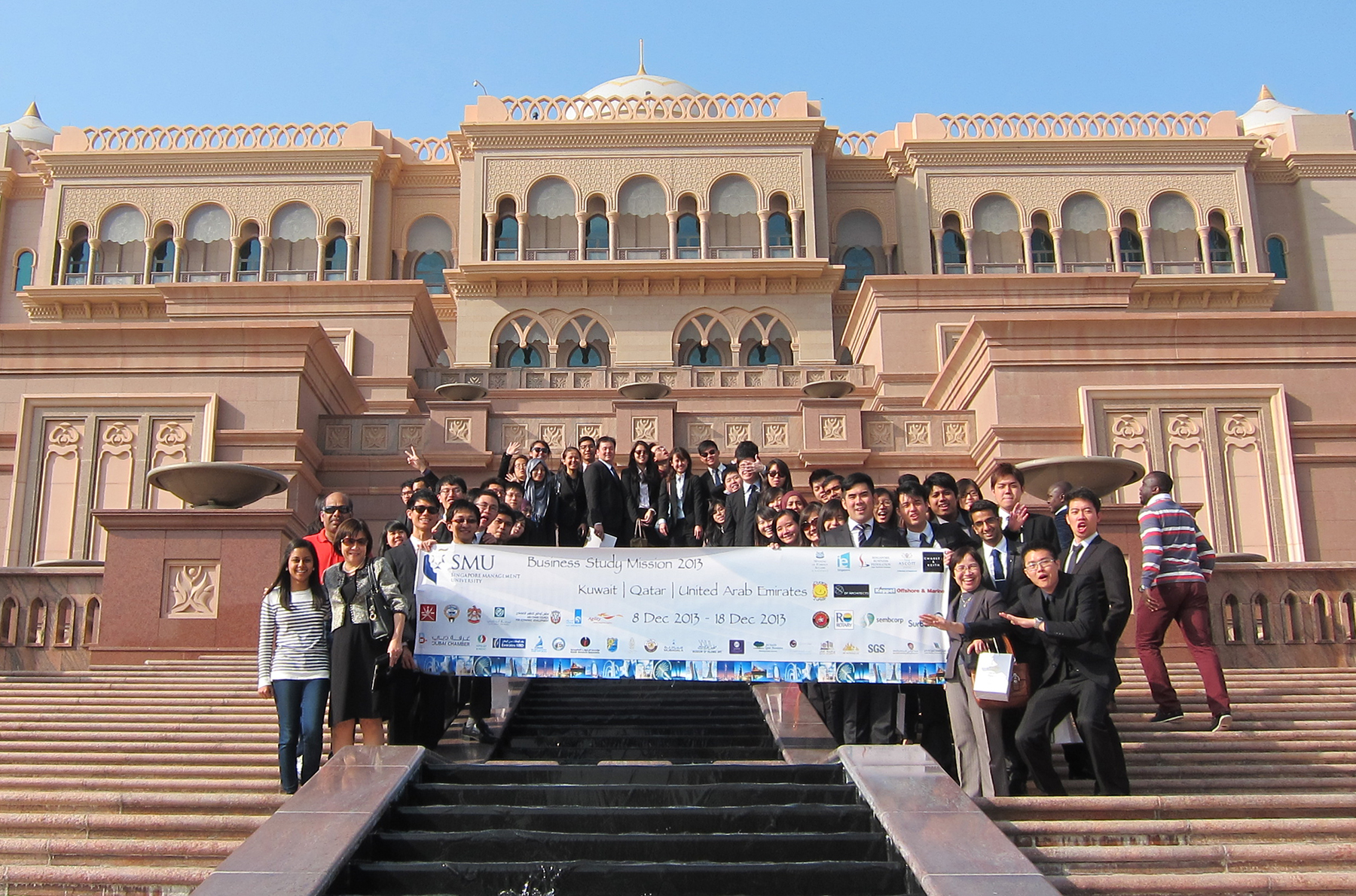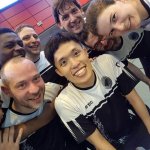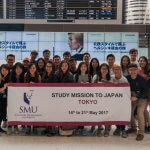By Damini Roy, SMU School of Economics
With an aim to provide students with a real-world understanding of business operations in the cultural context of a place, the Business Study Mission (BSM) programme offers lessons for a lifetime. We spoke to SMU students Cheryl Long (School of Social Sciences) and Qiumei Lin (School of Accountancy) who were part of an interesting BSM expedition to the Middle East.
1. Why did you choose to embark on a Business Study Mission (BSM) to the Middle East?
Cheryl: The Middle East is a region I couldn’t really put my finger on—how does it differ from East Asia and the West? What is the business environment like? I have heard much about the cultures in other parts of Asia and in Western countries but the Middle East is relatively unfamiliar. The prospect of exploring a strange and exotic land was enticing, leading to my decision to embark on this BSM.
Qiumei: One hears stories about travels to Europe, America and South East Asia… but how often would one hear of stories from the Middle East? I think only a few people actually know that the Middle East is part of the Asian continent! So I felt that it would be really interesting to explore a lesser-visited part of the world. And I felt that the BSM would be a really good opportunity to understand the Middle Eastern culture as well.
2. What were your first thoughts on getting selected for the BSM?
Cheryl: I was excited to embark on the adventure. It was a reputable programme loaded with valuable learning opportunities—from guest lectures and projects during the semester to multiple company visits during the trip itself. I knew that this might just be the journey of a lifetime.
Qiumei: I was ecstatic at being given the opportunity! I looked forward to my trip long before we even began our initial lessons.
3. What are the three most valuable lessons that you learnt while on the BSM?
Cheryl: The importance of preserving one’s culture and roots was deeply impressed upon me. On the path to modernisation, the Arabs were concerned with preserving their rich culture and traditions. This left a lasting impression in my mind.
I also found out the importance of relationship building in the Arab culture and business environment. It was a recurring message in guest lectures and from employees with whom we interacted in the Middle East. This is an insight we cannot glean from media reports, but from people who have truly experienced the culture.
Finally, I discovered that the Arabs are far-sighted and futuristic. Despite having amassed immense wealth from oil production, they have been diversifying the economy to reduce reliance on oil. Among many other visionary ventures, they have also sought to establish a knowledge economy via state-of-the-art education institutions.
Qiumei: The most important thing I’ve learnt is to not be too quick to judge. Prior to the trip, I had an impression that the Middle Eastern people are sexist against women and that they would be hard to communicate with. During the trip, I realised that it is not true as the people there were really friendly and nice! We had much more in common than I previously imagined.

4. What advice would you give other students who are considering this trip?
Cheryl: The programme focuses on inclusiveness, with everyone taking on a specific role, whether it is helping out with student retreat (R&R) arrangements or other tasks. The group projects in the course will enable one to understand more about the Gulf countries and the challenging process faced by Singaporean companies in entering the market in the Middle East.
Competition to enter the programme is typically intense. However, if you are interested to learn more about the Middle East, love travelling and forging new friendships, you should definitely try for the programme!
Qiumei: A lot of students in SMU tend to join such overseas trips with their friends. My advice would be to just sign up for this trip alone as you would really be able to make new and even closer friends along the way. This, as well as the other life lessons that are hard to learn in a classroom setting, will make the trip truly fulfilling.
5. Has this BSM changed your outlook towards things?
Cheryl: The Middle East is now an up and coming region, attracting multinational companies and global talent, which is an astounding development from mere decades ago. While unconventional, the desire to enter the Middle East is not that unusual now. As such, I felt inspired by the Singaporeans who decided to enter the Middle East in the past when it was more desert than cosmopolitan. Braving the unknown is always easier said than done.
Qiumei: I felt that this trip made my December holidays really fulfilling. I miss the fun activities on this trip, like the Desert Safari in Dubai and the Souk Wakif in Qatar, a really unique and pleasant experience. I do hope that more SMU students are inspired to go on business study trips such as this. It really enriches one’s college life.

SMU’s 2013 Middle East Business Study Mission (BSM) Team
Here’s a look back at another Business Study Mission to the Middle East, courtesy of Ngo Bang Lin, SMU School of Economics, Class of 2014:
Journey to the Middle East from Bang Lin on Vimeo.










